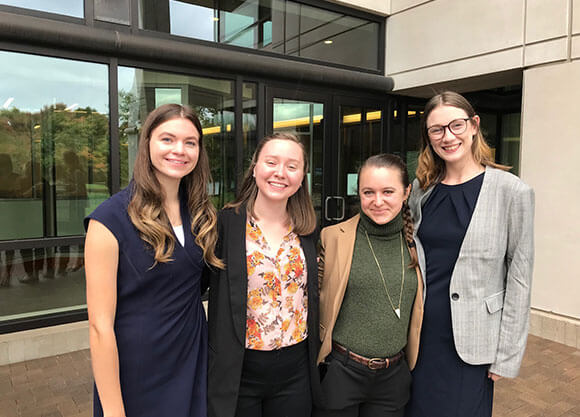
Law students shine during mock trial tournament
October 22, 2021

October 22, 2021

The QUSL team finished with a flawless 4-0 record after four rounds, won all 12 judge's ballots, and gained a 64-point differential. They are now preparing for the National Championships, slated for November 5th and 6th.
This year's casefile is a domestic violence-turned-murder case.
Emily Lanthier ‘22 and Sarah Smeriglio ‘22 acted as prosecutors, while Alexis Farkash ‘22 and Elizabeth Hrywniak ‘22 represented the defendant.
Each pair presented twice, competing against teams from University of Missouri-Kansas City, Arizona State, Wisconsin and Florida universities. The team prepared for five weeks.
“First thing we do is get together as group and talk about the case holistically: We approach it from the state’s and defense’s angles to see what they see,” said adjunct law professor Sean McGuinness'06, JD '09.
Students attended individual prep sessions with McGuinness and adjunct law professor Ryan O’Neill during the week and practiced group mock trials on Friday nights and the weekend. Practice focused on general trial advocacy techniques, persuasiveness and skills, said McGuinness. COVID forced this year’s mock trial competition online making students work on delivering their arguments well over camera.
The volunteering lawyers playing the judge and jury were recruited through email blasts to professional groups, alumni lists, prosecutors lists and public defender lists. In Connecticut, practicing lawyers are required to earn 12 continuing legal education credits annually. Participating as a judge in the mock trial fulfills three, said McGuinness.
After giving the team a week to regroup, practice will resume with a sustained intensity to prepare for the championships.
“The team will present the same case, though there will be potentially minor changes,” said O’Neill. “We’ll have an initial conversation about what worked and what didn’t during the competition. We’ll also brainstorm new ideas how to enhance the presentation, as well as get back to working on advocacy skills.”
As the team ramps up for the upcoming competition, they are grateful for the support they continue to receive from their professors, as well as each other.
“My personal favorite part of the process as a whole was developing and delivering my opening statement and watching the rest of my teammates do the same with their respective speeches throughout the month,” said Lanthier.
Farkash, who was honored with one of eight “Outstanding Advocate” awards during the trial, agrees that her teammates’ encouragement was intrinsic to her performance.
“There was one practice a week before the competition where we all left in tears, but we were able to improve from there and support each other through the more challenging parts,” said Farkash. “[It’s great] when we have a really good trial wrap up and feel that high from doing our best no matter what the end result is.”
Quinnipiac Today is your source for what's happening throughout #BobcatNation. Sign up for our weekly email newsletter to be among the first to know about news, events and members of our Bobcat family who are making a positive difference in our world.
Sign Up Now